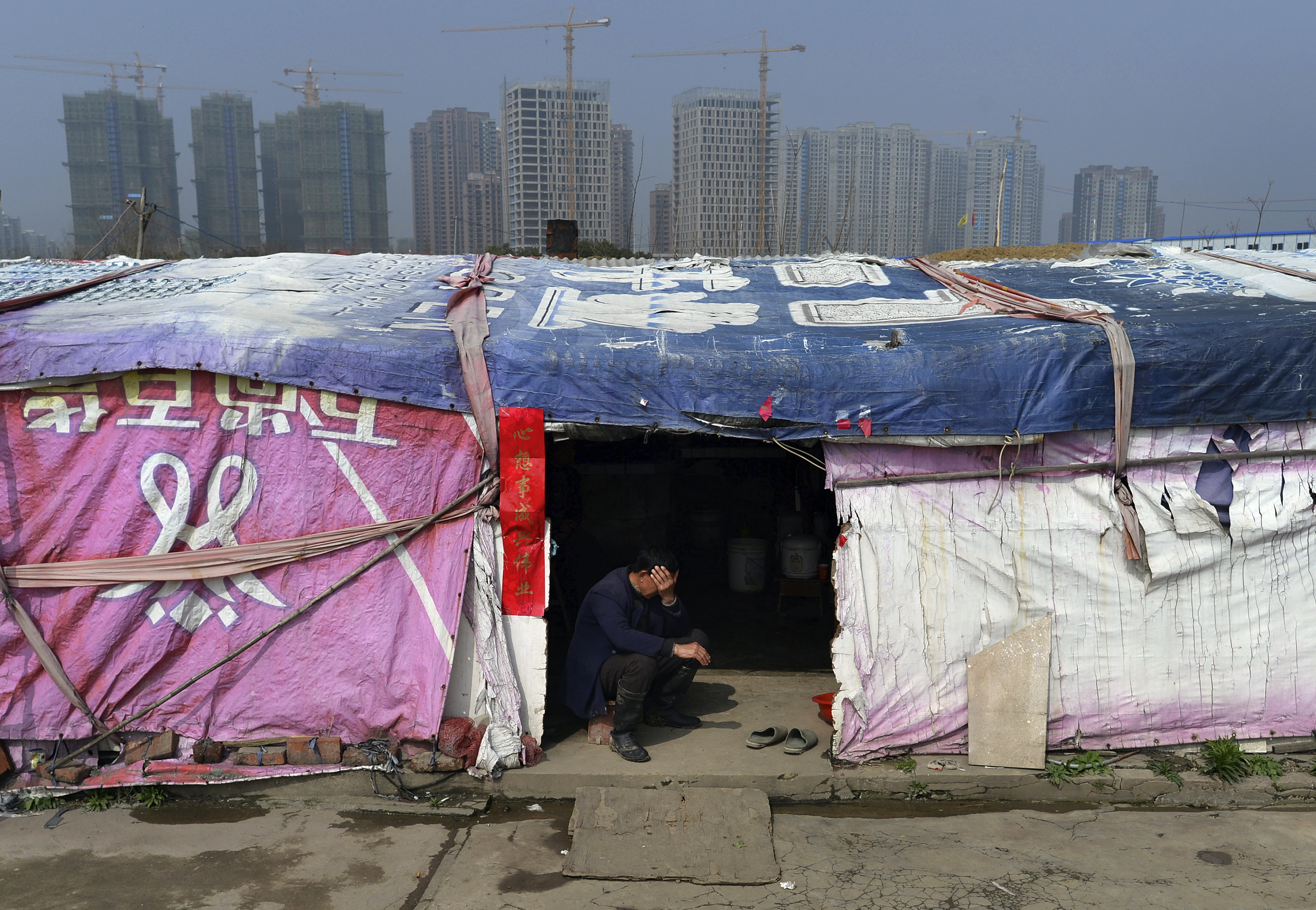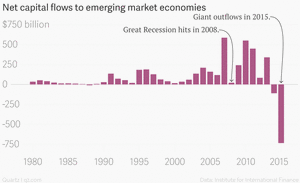Why money has suddenly started flowing out of emerging markets
Is China in a pickle?


A free daily email with the biggest news stories of the day – and the best features from TheWeek.com
You are now subscribed
Your newsletter sign-up was successful
In the latest weird economic news, something is happening in international capital flows that we haven't seen since the late 1980s. Emerging markets, which have seen money flowing into their economies for years, suddenly saw those flows reverse — and reverse massively — in 2015. On net, $111 billion flowed out of the emerging markets in 2014. But the latest numbers from the Institute for International Finance peg the outflow in 2015 at a whopping $735 billion.
Okay, I'm sure you're saying. That sounds dramatic. But, uh, what does it mean?
Let's break it down. First off, by emerging markets, we mean countries that are beginning to develop, that have not reached the level of advanced western nations like America or Britain or Germany yet, but are clearly on their way there. The big five are Brazil, Russia, India, China and South Africa — often referred to by the acronym BRICS — plus a few others in Latin America and South Asia.
The Week
Escape your echo chamber. Get the facts behind the news, plus analysis from multiple perspectives.

Sign up for The Week's Free Newsletters
From our morning news briefing to a weekly Good News Newsletter, get the best of The Week delivered directly to your inbox.
From our morning news briefing to a weekly Good News Newsletter, get the best of The Week delivered directly to your inbox.
Second, when we talk about a capital inflow to a country, we mean money moving into that country's market to buy financial assets. These could be that government's bonds, stocks in the country's resident companies, or other instruments. A capital outflow is exactly the opposite: Money is leaving that country's market to go buy assets elsewhere.
A third reason this is important is because capital flowing into emerging markets is how it's generally suppose to work, at least according to the standard textbooks. These countries are still building up their economies, so they need investment — presumably from rich developed countries, who have money to spend. Under this scenario, the emerging economy with capital flowing into it would also be a borrower, on net — other countries are buying its debt and its equity and so forth. And again, this makes sense: An emerging economy is still building up its roads and infrastructure and offices and factories and technology and everything else, so it's got a lot of upfront costs it needs to take care of.
With all that in mind, you can see why the recent shift in flows looks a might bit odd.

(Graph courtesy of Quartz.)
A free daily email with the biggest news stories of the day – and the best features from TheWeek.com
The flows have gone up and down before. In particular, you can see the dip around 2000, when capital stopped flowing into the emerging markets almost completely, thanks to the East Asian financial crisis. But for the most part, the trend is what you're supposed to see: More capitol flowing into emerging markets than out of them.
Of course, all countries see capital flowing in and out — and act as both borrowers and lenders — all the time. So we're talking about the net results. What's especially interesting is that there was a long build-up of outflowing capital starting around 2000, only briefly interrupted by the 2008 crash. But inflowing capital was always bigger. It was until 2015 that inflows suddenly plunged, leaving those countries with a net outflow.
Part of the story is probably the crash in oil prices. Several major emerging economies — think Russia and Venezuela — rely disproportionately on oil exports to fuel their economies and government budgets. So when the price crashed, that made international investors nervous. Now these countries' bonds and stocks and so forth don't look like such good bets anymore, so people are pulling their money out.
But the big story is probably China's economic slowdown, which is making investments look shaky there for exactly the same reason. China's political rulers — who often tend to double as its business rulers — have also been loading up a lot of the country's private enterprises up with debt.
As their economy slows down and the investors pull out, that drives down the value of China's currency. That then makes it more expensive for China's corporations to pay off debt obligations they have denominated in other currencies. So a kind of feedback loop happens, in which the falling investments exacerbate the debt payments, both of which drive the capital outflows higher.
One last detail, though: Capital flows work in hydraulic relation to trade flows. If a country has a net inflow of capital — like emerging economies are supposed to — it should also have a net trade deficit. Again, because emerging economies are building themselves up, they can't make enough of the stuff needed to build all those roads and infrastructure and offices and factories and technology themselves, so they import extra from elsewhere. Conversely, when they go into recession, investors pull out, the value of their currency drops, their exports become cheaper, and they move closer to a trade surplus. It's a sort of natural corrective built into the relationships of trade and capital flows that helps economies in recession recover.
Now, thanks to currency manipulation, the Chinese yuan is considerably cheaper than the U.S. dollar already. But it's also designed with a peg to the dollar: It moves up and down as the dollar moves. So the yuan is still relatively expensive compared to a lot of other currencies out there, and there's still plenty of room for China's goods to become more competitive in other markets.
On top of that, because of how those same trade and capital flows work, the fallout from China's slowdown should be relatively contained to its own borders. And the effect on the yuan from the capital outflow could ultimately help it recover faster.
Jeff Spross was the economics and business correspondent at TheWeek.com. He was previously a reporter at ThinkProgress.
-
 Democrats push for ICE accountability
Democrats push for ICE accountabilityFeature U.S. citizens shot and violently detained by immigration agents testify at Capitol Hill hearing
-
 The price of sporting glory
The price of sporting gloryFeature The Milan-Cortina Winter Olympics kicked off this week. Will Italy regret playing host?
-
 Fulton County: A dress rehearsal for election theft?
Fulton County: A dress rehearsal for election theft?Feature Director of National Intelligence Tulsi Gabbard is Trump's de facto ‘voter fraud’ czar
